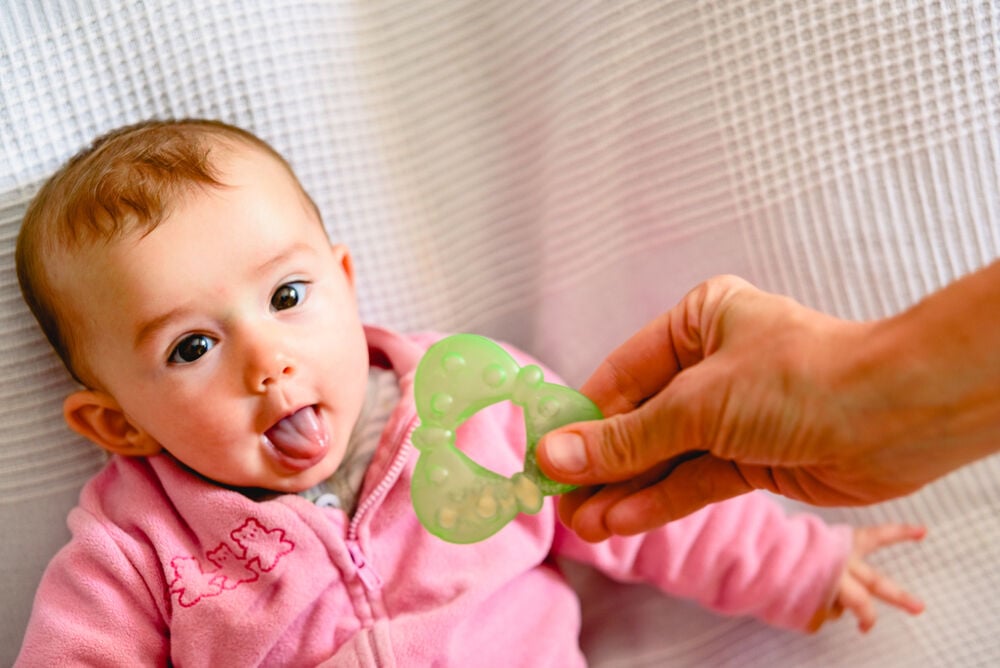-
Tracking cycle
-
Getting pregnant
-
Pregnancy
-
Help Center
-
Flo for Partners
-
Anonymous Mode
-
Flo app reviews
-
Flo Premium New
-
Secret Chats New
-
Symptom Checker New
-
Your cycle
-
Health 360°
-
Getting pregnant
-
Pregnancy
-
Being a mom
-
LGBTQ+
-
Quizzes
-
Ovulation calculator
-
hCG calculator
-
Pregnancy test calculator
-
Menstrual cycle calculator
-
Period calculator
-
Implantation calculator
-
Pregnancy weeks to months calculator
-
Pregnancy due date calculator
-
IVF and FET due date calculator
-
Due date calculator by ultrasound
-
Medical Affairs
-
Science & Research
-
Pass It On Project New
-
Privacy Portal
-
Press Center
-
Flo Accuracy
-
Careers
-
Contact Us
How to Soothe a Teething Baby: Teething Remedies That Do Work


Every piece of content at Flo Health adheres to the highest editorial standards for language, style, and medical accuracy. To learn what we do to deliver the best health and lifestyle insights to you, check out our content review principles.
Remember to always consult your physician before using medications for teething — and stay from old wives' tales like rubbing whiskey on the baby's gums!
Teething pain signs and symptoms
One of the first signs of teething is increased fussiness and an abundance of drool. Your baby will also chew on more things, from hard toys to their fingers or fist. Nursing mothers may even feel the baby's teeth during feeding, and for some, silicone nipple shields can help alleviate pain from the tiny teeth.
Other symptoms of teething may be a change in eating patterns or diarrhea, mainly due to the extra saliva that the baby produces. A low-grade fever, under 100 degrees, may also accompany teething. Fever and diarrhea are symptoms that overlap other illnesses besides teething, so it's best to check with your child's pediatrician if they persist, just in case.
How to soothe a teething baby
Baby teething remedies involve several different easy-to-follow home remedies, and trial and error is often the best way to soothe your baby. Soon, though, this will pass and you'll be feeling more well-rested.
Home remedies for teething babies
Many home remedies involve calming your baby and ensuring that they're comfortable. Some will also help your baby's teeth cut through the gums, alleviating pressure.
Cold
Cold helps naturally numb your baby's gums and can be administered either as a small teething ice pack that you rub on their gums or a cold washcloth for baby to chew on. Many baby stores also sell small teething rings that can be placed in the refrigerator, but be careful to inspect before every use for small tears in the seams of the material.
Also, make sure that these teething rings aren't frozen solid but rather chilled, allowing your baby to chew more easily.
Your baby's diminished appetite may be alleviated a little with colder foods that feel good on the gums, such as homemade cold applesauce, cold yogurt, or soft cold fruit. Make sure before introducing any new cold fruits that the pieces are small enough for babies at each stage of development to chew.
Chewing toys

Sometimes, the teeth coming in will cause the baby's gums to itch, and harder plastic provides relief. These chewing toys can also help the teeth break through the gums. Make sure that you only purchase teething rings and the like that have no small parts that can come off in baby's mouth and that they're age-appropriate for your baby.
Soft silicone teething toys, shaped to reach the back teeth as well as provide comfort for the front teeth, are a way to help your baby when teething through all stages of their development.
Massage
You may also choose to massage your baby's gums with your fingers, but make sure that you're not sick and your hands are clean. This can help increase the blood flow to the baby's gums and provide relief, as well as help the tooth buds break through.
You may also choose to use a medically safe gauze pad, moistened with cold water, to massage your baby's gums, especially if they have responded well to cold on the gums already.
Hard foods
If your baby is already eating solid foods, then something like a chilled cucumber without the peel or chilled carrot rings may help with the pain of back molar teething. Make sure to watch your baby carefully for signs of choking, especially if the hard food is relatively new to them.
Drying the drool
Your baby will produce an excessive amount of drool when teething. The teething process stimulates drooling, which can lead to a rash on our baby's chin or cheeks. Make sure that you wipe the drool away to help keep your baby's delicate skin dry. For dry, chapped skin, and to reduce the effect that the drool has on your baby's skin, a simple barrier such as petroleum jelly can help keep the rash at bay.
Medications
Before using any over-the-counter medications for your teething baby, make sure that you check with your child's physician first. If you can, bring the medications or the name and ingredient list to your baby's doctor at a well-baby checkup.
Over-the-counter numbing medications may be fine for your baby, but be careful to avoid any herbal or homeopathic teething tablets, as the ingredients may not be safe for babies under a year old. Especially be careful to avoid any pain reliever that contains benzocaine or lidocaine as these can be harmful or even fatal to your baby.
Over-the-counter pain relievers such as acetaminophen or ibuprofen, however, may help with some of the pain.
Baby teething side effects
Side effects from teething can include a low-grade fever and diarrhea, as well as reduced appetite. These symptoms, coupled with the fussiness and excess drool, may mimic some of the side effects of your baby's six- and nine-month vaccinations, so it's important to check with your baby's doctor to differentiate between them.
When to call a doctor
While most of your baby's teething care can be done safely at home, there may be times you'll need to consult with your child's doctor. A low-grade fever is generally normal, but if your child's fever reaches over 101 degrees Fahrenheit and is accompanied by ear pulling, it may be a sign of an ear infection.
Diarrhea is also common for teething babies, but diarrhea accompanied by vomiting and a high fever is a sign of a more serious illness, and you should call your pediatrician.
Teething babies and toddlers can be exhausting for both parents and baby. Simple home remedies that address the pain and fussiness can help alleviate the unfamiliar pain your baby is experiencing. Pay close attention to teething symptoms and make sure that there isn't another underlying cause, but plenty of TLC and fluids will help make baby feel better.
Take a quiz
Find out what you can do with our Health Assistant


Hey, I'm Anique
I started using Flo app to track my period and ovulation because we wanted to have a baby.


The Flo app helped me learn about my body and spot ovulation signs during our conception journey.


I vividly
remember the day
that we switched
Flo into
Pregnancy Mode — it was
such a special
moment.
Real stories, real results
Learn how the Flo app became an amazing cheerleader for us on our conception journey.




